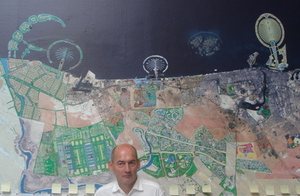
Over at the Venice Superblog are a number of great interviews with various architects and architectural thinkers from the Venice Biennale.
I was particularly taken with this interview between Rowan Moore and Rem Koolhaas, talking about Dubai and the Gulf states, not regarded as being of high architectural merit by the majority of critics, and thus an area of great interest for Koolhaas and his OMA/AMO consultancies. I love the way that Koolhaas refuses to be pinned down by Moore's line of questioning.
"..there is clearly a convergence between star architects and typical architecture also at work, and the obligation to extravagance creates an almost seamless and indistinguisable new breed of architecture."
I've transcribed the interview for anyone who's interested:
Rowan Moore: This is Rowan Moore talking to Rem Koolhaas in the United Arab Emirates room. Rem, what is this?
Rem Koolhaas: It's actually the Gulf room, it's a year between working in the Gulf, and once we started we decided to try get involved on many levels, and in many different places, and as we proceded, we were totally stunned by the discovery of the total and radical transformation of not only what is going on but the even bigger transformation that is beng plannned here.
And so what this does is completely document not our own work at all but the work of other offices, what their plans are and what the scale of the plan is and what the context is. And at the same time we were also surprised by the intensity of derision in architectural circles. There are some quotes there on the wall: [inadudible], "Lawrence of Surburbia", [inadudible], "Skyline of Crack"[?] and most damning of all "Disney meets Albert Speer"
Now that tone reminded me of the similar derision of Singapore, which was famously compared by William Gibson as "Disneyland with the Death Penatly". And so what I am trying to confront also is what the west is so contemptuous of it's own exports, it is clearly largely being done by Australian and Anglo Saxon architects, so we a huge responsibility. It's about what we define as public space, what we define as resorts, what we define as exciting architecture and so it is really confronting that contempt.
Also we did research and discovered that in almost all these cities very significant architects have been working like the Smithsons and Utzon in Kuwait, SOM in Saudi Arabia, and that they produced work there that is very respectable, very intelligent about climate envelope, and that there was a beginning of a tradition that has now been totally abandoned for totally unsustainable stuff, and what is finally coming is there is clearly a convergence between star architects and typical architecture also at work, and the obligation to extravagance creates an almost seamless and indistinguisable new breed of architecture.
RM: So if you are to be critical of the new work as not being sustainable, does that put you in the position of the other people who are critical of the western exports.
RK: Err, not exactly, because i think that part of our project will come in the form of our own projects, so we'll have the opportunity to do it differently, and clearly we'll try and connect into some of our impulses.
RM: But if somebody does suburbia or a skyline or Disney in the Gulf, does it become more or less interesting, than if it's done in the West?
RK: I'm not looking to compare them. I see it as a kind of endgame, of the architectural system, to the extent that the world is running out of new places to start all over again, so it has been China, and clearly China has been producing a number of very interesting architectures, but not a new architecture, and the same thing is going on here, even though in terms of opportunity it represents theoretically a vast site for inventing a new architecture.
RM: And how would you situate yourself in working here if everything is becoming a seamless whole, would you think of yourself as being part of that whole, or somehow finding an independent position?
RK: We try to maintain a critical and independent position, but of course we participate in the same opportunities, but increasingly I think that we are trying to outwit in the work and in the projects some of the more painful dilemmas.
RM: It's striking that in Dubai in particular is in a way a contrived situation, born of the policy of the ruling family of Dubai, as in their different ways have been Las Vegas and West Berlin in the past, which are other things which have fascinated you, Berlin as a whole. You could say these are esoteric conditions that are not so meaningful to the rest of the world, that they are abnormal, or do you think that their abnormality is something we can learn from in other places.
RK: Well I think it is very true that we could say it's an esoteric development which is irrelevant to other existing cities, but I would say it is a condition of the new, and the global condition of the new which by implication must have the interest and the concern of anybody who is interested in the future.
RM: So this is the future?
RK: It's on the way to turning out like this, but I guess there is some moral expectation that we come to our senses. Which is not to condemn everything that's happening, very clearly, because there are also very smart things.
RM: I know you wouldn't do that! Thank you Rem.
